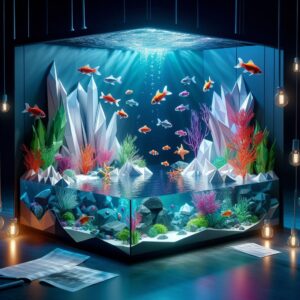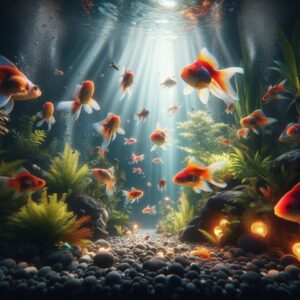
Your Shubunkin Fish
Shubunkin coldwater fish add a captivating charm to any home aquarium with their magnificent colours and graceful movements.
These gorgeous goldfish feature stunning calico patterns, which makes them popular among aquatic enthusiasts.
Shubunkins are well-known for their ease of care, making them an excellent choice for new and experienced aquarists.
However, ensuring their health and longevity requires a detailed understanding of their needs.
This comprehensive tutorial will cover the most critical aspects of caring for Shubunkin coldwater fish, such as tank setup and health care.

Tank Setup
Shubunkin goldfish require a large tank to grow and thrive.
Experts recommend a minimum of 20 gallons per fish to provide ample swimming space and reduce stress.
Furthermore, investing in a quality filtration system is crucial because Shubunkins are known for their messy eating habits, which can quickly degrade water quality.
Decorating the tank with smooth rocks, driftwood, and natural or fake plants improves its appearance while providing important hiding spots and a sense of natural surroundings.
It is crucial to avoid vital decorations that could harm these delicate fish.
Water Parameters
Shubunkin coldwater fish require excellent water conditions to survive and thrive.
They thrive in cool temperatures of 65°F to 75°F (18°C to 24°C). Monitor the water temperature regularly with an accurate thermometer to avoid changes that could stress the fish.
Furthermore, keeping the pH between 7.0 and 8.4 and the water hardness between 5-20 dGH (degrees of general hardness) creates a favourable environment for their health.
Routine water tests for ammonia, nitrite, and nitrate levels are required, with zero levels being the ideal goal to reduce stress on the fish.
Feeding
Shubunkin goldfish are omnivorous, eating a variety of high-quality flakes, pellets, and live or frozen delicacies, including brine prawns, bloodworms, and daphnia.
Overeating can lead to health problems and poor water quality; therefore, it is recommended that they be fed small meals 2-3 times per day.
Monitoring their eating habits and adjusting portions is crucial to their long-term health and well-being.
Tank Maintenance
Regular tank maintenance is required to maintain optimal water quality and safety for Shubunkin coldwater fish.
Performing 25-50% water changes every 1-2 weeks helps to remove waste and replace essential minerals.
Vacuuming the substrate during water changes eliminates uneaten food and detritus, lowering ammonia levels and keeping the habitat clean.
Regular inspection of tank equipment is required to detect any abnormalities, and timely filter replacement provides efficient filtration.

Health and Disease Prevention.
Monitoring the behaviour and appearance of Shubunkin coldwater fish is crucial for early detection of illness. Lethargy, loss of appetite, strange swimming patterns, or apparent lesions are all red flags that demand immediate attention.
Removing ill fish from a quarantine tank and reintroducing them to a healthy one minimises the risk of disease transmission while protecting the present residents’ health.
It is crucial to avoid sudden changes in water temperature or quality, as these can stress the fish and impair their immunity.
Caring for Shubunkin coldwater fish is a pleasant activity that provides endless joy and fulfilment to aquarium enthusiasts of all skill levels.
You can help your Shubunkins grow and thrive by creating a favourable environment, giving proper nutrition, and adhering to a tight maintenance routine.
Remember to be cautious, frequently monitor water parameters, and enjoy the calm and beauty these excellent fish provide to your aquarium.
The post Caring For Your Shubunkin Fish appeared first on Unity Pets.
The Article Caring For Your Shubunkin Fish Was Found On https://limitsofstrategy.com
The Article Caring For Your Shubunkin Fish First Appeared ON
: https://ad4sc.com

Comments are closed